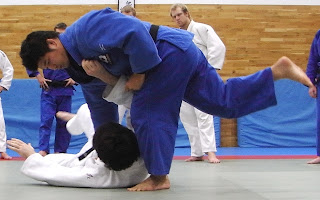I have chosen to highlight in this post the thoughts of some of these
present and former students who took the decision to improve their coaching.
Firstly, Danny Williams, is
a still an active player, an Olympian, who competed in the 2012 London Olympic
Games, Danny is a player at Camberley Judo Club, and a student at Anglia Ruskin
University, following the EJU Performance Coach Award. He is preparing already
for his future coaching career, and works on a weekly basis with the England
Regional Cadet players.
I have two favourite quotes from Danny’s blog;
“Sports coaching and training from a young players perspective cannot
be a democracy, the coach must deliver precise technical fundamental practice
and sparring training, and the athlete must follow precisely the given
instructions.”
Then talking about his improved ability to combat frustration he says…
“I believe I owe this to things I’ve learned from my own experience and
from my coach who has helped me to see training and competition as a process
rather than the be all and end all.”
Danny’s coach, is another of my former students, Luke Preston. He graduated in 2008 from the EJU Performance Coach
Award. Luke was a coach for Great Britain at the London Olympic Games, where his
athlete Karina Bryant, won a bronze medal. Follow Luke on twitter;
Next blog is from Mike Newton,
Head Coach at Vale Judo Club, graduate of the EJU Performance Coach Award in
2009. In 2010, Mike spent a placement at Sagami High School, near Tokyo. A
feeder high school to Tokai University, former students include Yasuhiro
Yamashita and Kosei Inoue.
Mike made a number of changes to his club environment after visiting
Sagami High School, read about them at;
On 12 February 2010, Mike presented a case study of High School student
Naohisa Takato. Three years later, I watched Takato win the Paris Grand Slam.
At the time of writing he is ranked 1st in the IJF World Ranking List.
Discussing his training environment in Sagami, my favourite quote from Mike is…
“Every student knows what to do and when to do it – coaches simply
provide technical input, set the training atmosphere and provide encouragement
– most of the time things run like clockwork.”
Also working with the same age group is Dave Elmore. Dave graduated the EJU Performance Coach Award in
2011. He works with Wolverhampton University and Walsall College, delivering
the Advanced Apprenticeship in Sporting Excellence. A structured judo
curriculum for junior players.
I like this quote…
“I feel that you should always be willing to try new
ideas and look at other sports and activities to find a new edge.”
One very prolific blogger is Bob Challis. Having graduated from the EJU High Performance Coach Award in 2009, Bob is now the course leader, and a Senior Lecturer at Anglia Ruskin University. Bob is continuing to develop himself and is in the second year of his PhD.
My favourite line from his blog is;
“To be honest there is no real secret, for me it is about mat time and
volume of randori.”
Bob also quotes from a well-known former judo player, and US President,
Theodore Roosevelt;
“It is not the critic who counts; not the man who points out how the
strong man stumbles, or where the doer of deeds could have done them better.
The credit belongs to the man who is actually in the arena, whose face is
marred by dust and sweat and blood; who strives valiantly; who errs, who comes
short again and again, because there is no effort without error and
shortcoming; but who does actually strive to do the deeds; who knows great
enthusiasms, the great devotions; who spends himself in a worthy cause; who at
the best knows in the end the triumph of high achievement, and who at the
worst, if he fails, at least fails while daring greatly, so that his place
shall never be with those cold and timid souls who neither know victory nor
defeat. “
One could argue that the “king” of the judo blog is Lance Wicks. Lance also graduated from
the EJU High Performance Coach Award in 2009. He is now a member of the IJF
computer team, providing the live streaming from IJF and EJU events across the
world. Lance developed the site http://www.planetjudo.com/
which aggregates all the judo blogs into one feed. He has English, Spanish and French
versions.
On his blog at http://www.judocoach.com/
Lance reflected on each lecture during his time studying as a coach. To quote a
couple of reflections;
“One of the great things about this course is that most all of the work
we do has real world application and this development plan I have to write
could be really good if executed.”
“One of the most important skills any Judoka and in particular any Judo
coach can have is the ability to look at things critically and assess the value
of what they read, see or hear.”
Finally, I end this post with some light relief. If Lance is the king,
then officially the “Queen of Blog” is Aki
Inoue. She is a friend of Judospace, wife of All-Japan Judo Federation Head
Coach, Kosei Inoue, and a celebrity in her own right. Aki’s blog has a huge
following amongst her fans in Japan.

I hope you enjoy.
To find out more about the experience of these coaches, visit our website at www.judospace.com





